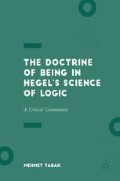Abstract
In this chapter, Hegel first informs us that each thing has a specific quantum on which its quality depends. In the second section, he first considers “the rule,” which is quickly dismissed as an arbitrary, external measure. He then takes up the issue of how the specific measure of things is quantitatively specified in a ratio. This consideration shows that this ratio ultimately expresses the measure relation of two material things. He then switches to the consideration of the ratios that measure motion , in which the relationship of time and space come into play. From this consideration, he deduces the conception of measure as a being-for-itself, which somehow repels itself into two material things, each one of which has a specific real or materially determined measure.
Access this chapter
Tax calculation will be finalised at checkout
Purchases are for personal use only
References
Findlay, John F. 1958. Hegel: A Re-examination. New York: Collier Books.
Halper, Edward. 1998. The Logic of Hegel’s Philosophy of Nature. In Hegel and the Philosophy of Nature, ed. Stephen Houlgate, 29–49. Albany, NY: SUNY Press.
Harris, Errol E. 1983. An Interpretation of the Logic of Hegel. Lanham: University Press of America.
Hegel, Georg W.F. 1833. Wissenschaft der Logik. Erster Theil: Die Objektive Logik. Erste Abtheilung: Die Lehre Vom Seyn, ed. Leopold Von Henning. Berlin: Duncker and Humblot.
Hegel, Georg W.F. 1894. Lectures on the History of Philosophy, Vol. 1. Translated by Elizabeth S. Haldane. London: Kegan Paul.
Hegel, Georg W.F. 1969a. Hegel’s Science of Logic. Translated by Arnold V. Miller. Amherst, New York: Humanity Books.
Hegel, Georg W.F. 1969b. Wissenschaft der Logik I. Erster Teil: Die Objektive Logik. Erstes Buch, ed. Eva Moldenhauer und Karl M. Michel. Frankfurt am Main: Suhrkamp Verlag.
Hegel, Georg W.F. 1970. Philosophy of Nature, Being Part Two of the Encyclopaedia of the Philosophical Sciences. Trans. by Ardold V. Miller. Oxford: Oxford University Press.
Hegel, Georg W.F. 1991. The Encyclopaedia Logic: Part I of the Encyclopaedia of Philosophical Sciences with the Zusätze. Trans. by T.F Geraets et al. Indianapolis, IN: Hackett.
Inwood, Michael. 1983. Hegel. Oxon, UK: Routledge.
McTaggart, John. 1910. A Commentary on Hegel’s Logic. Cambridge, UK: Cambridge University Press.
Taylor, Charles. 1977. Hegel. Cambridge, UK: Cambridge University Press.
Winfield, Richard D. 1998. Space, Time and Matter: Conceiving Nature without Foundations. In Hegel and the Philosophy of Nature, ed. Stephen Houlgate, 51–69. Albany, NY: SUNY Press.
Author information
Authors and Affiliations
Corresponding author
Rights and permissions
Copyright information
© 2017 The Author(s)
About this chapter
Cite this chapter
Tabak, M. (2017). Specific Quantity. In: The Doctrine of Being in Hegel’s Science of Logic. Palgrave Macmillan, Cham. https://doi.org/10.1007/978-3-319-55938-4_8
Download citation
DOI: https://doi.org/10.1007/978-3-319-55938-4_8
Published:
Publisher Name: Palgrave Macmillan, Cham
Print ISBN: 978-3-319-55937-7
Online ISBN: 978-3-319-55938-4
eBook Packages: Religion and PhilosophyPhilosophy and Religion (R0)

